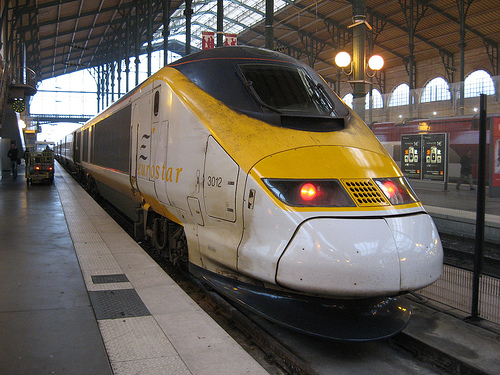
This is a guest post looking at Eurostar’s social media response a year we wrote about their very public lack of response during a huge failure. The piece is by Colette Ballou, the founder of Ballou PR, who was stuck in the Eurostar during the incident and later spoke about her experience via Twitter and was interviewed on UK national news. Kate Spiers is the head of Wisdom London, a social media consultancy.
This week marks the one year anniversary of the Eurostar incident that taught Eurostar – and many others – that social media is not simply a nice-to-have tool for the marketing department to play with for campaigns, but the place to which people increasingly turn for real-time information and commentary.
In the past year, Eurostar has had plenty of time to translate social media disaster into social media maturity. Negative online sentiment may have died down, but they have not fully engaged customers, nor allowed them greater ownership of online channels. Think of how Dell turned a tidal wave of online dissatisfaction into a brilliant coup and reversed negative sentiment by using social media channels to their most positive advantage, daring to let go of the controls a little. Now compare that to where Eurostar is today.
An assessment of their social media engagement suggests learning over the past year, but at a very cautious level. The new @eurostarUK (marketing focus) and @eurostarcomms (corporate comms) and @eurostar (customer service) Twitter feeds answer passenger questions in real-time (but seemingly only within office hours) and wish people a nice trip. They also monitor mentions of Eurostar and often jump in on Twitter conversations with chatty asides. The Facebook page fulfills a similar function, waxing lyrical about Parisian landmarks with excited travellers and sharing what amounts to cut-and-pasted nuggets of standard info from their website on refund and check-in policy.
It’s nice. Friendly. Helpful. Up to a point. But are they missing the point? When asked about their social media strategy, a spokesperson replied via email: “Before 2010 we used social media mainly as a marketing channel, and not as a corporate communications or customer service tool. It was a missed opportunity, and since then we’ve listened and moved on.” Aude Criqui, Senior Press Officer, Eurostar.
But notice that negative comments posted in their stream or hastagged #Eurostar don’t always get a response. One passenger, for example, was frustrated about a lack of information and hashtagged Eurostar, but no account openly responded:
@jonworth Jon Worth: “Rubbish, #Eurostar – clear since Ebbsfleet train 9132 is late. We’re due now in BXL but haven’t reached Hal, no announcement to passengers.” (11 Dec)

In fact neither @Eurostar or @EurostarUK tweeted at all that day – perhaps because it was Saturday. Must be frustrating for @jonworth when, come Monday morning, @EurostarUK jumps on other travellers’ tweets that celebrate the “free stuff” in the lounge but never acknowledged his genuine complaint.

Here, Eurostar is missing a chance to demonstrate their social media maturity by asking more probing questions about what customers want, and showing greater commitment to dealing with dissatisfaction. After all, social media provides a perfect listening post for measuring sentiment and gathering very specific user feedback, not just the best restaurants to visit in Paris. By now, Eurostar certainly should understand this. But they are missing the opportunity to show us they’ve grown up.
More than that, if last year should have demonstrated anything, it’s that social media means you have very little to hide behind. What consumers really want to see is accountability, and you can’t get that from an avatar. The Eurostar management team, which took such a bashing last year, is still notably quiet online and management communications are still tightly controlled. This is a huge missed opportunity to build relationships through social media and to demonstrate willingness to be called to account in times of crisis. We offered Mary Walsh the chance to add comment to this article, but it was handed over to the press office. They were helpful, but again, they missed the point.
So in terms of social media maturity, Eurostar is still perhaps in its gawky adolescence, learning the social skills that help you get on in life, but not quite comfortable enough with their social selves to totally open themselves up to the good and bad life may throw their way.
Which begs the question, are they socially mature enough to deal with the next crisis?. After all, they operate at the mercy of Eurotunnel, weather, unions – and now social media.